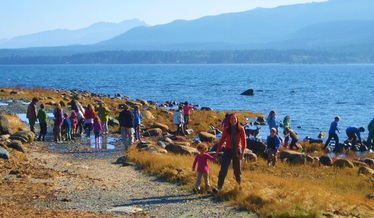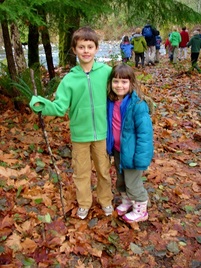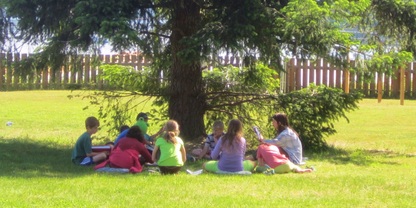Nature: Dr. David Suzuki Comments
 Students seek intertidal invertebrates.
Students seek intertidal invertebrates.
At Beachcombers Academy, daily outdoor time and quality academics create an ideal learning environment for our students.
Students are immersed in our coastal environment. Students watch eagles from the school deck, learn at the beach or the local estuary in front of the school, enjoy many fieldtrips, watch the oyster fishers come and go from the school grounds, or simply enjoy a lesson outside. It is this kind of outdoor programming that Dr. David Suzuki believes is deeply important for today’s children.
Students are immersed in our coastal environment. Students watch eagles from the school deck, learn at the beach or the local estuary in front of the school, enjoy many fieldtrips, watch the oyster fishers come and go from the school grounds, or simply enjoy a lesson outside. It is this kind of outdoor programming that Dr. David Suzuki believes is deeply important for today’s children.
 Fieldtrip to view spawning salmon.
Fieldtrip to view spawning salmon.
In a gesture of support, Dr. David Suzuki sent a thoughtful letter to Beachcombers. In his letter, Dr. Suzuki offered the following comments for use by Beachcombers:
"Most Canadians, especially young people, now live in urban settings. Increasingly, the amount of time spent outside has become amazingly small. Instead, we spend more and more time in front of television, computer and cell phone screens, preoccupied with a technological world and estranged from nature. We need nature, nature gave us birth and nurtured us as a species and now gives us our most precious need—clean air, clean water, clean soil and food, and clean energy from the sun.
"Most Canadians, especially young people, now live in urban settings. Increasingly, the amount of time spent outside has become amazingly small. Instead, we spend more and more time in front of television, computer and cell phone screens, preoccupied with a technological world and estranged from nature. We need nature, nature gave us birth and nurtured us as a species and now gives us our most precious need—clean air, clean water, clean soil and food, and clean energy from the sun.

Deprived of those services of nature, we sicken and die. For most of human existence, we understood that, but now suddenly as urban creatures, we have lost that understanding. We fight to protect what we love. How can we love and appreciate nature if we are not out in her world. Nature deficit disorder results from our disconnect. We have to develop all programs in schools to get children out in nature.”
Signed, David Suzuki.
The term ‘nature-deficit disorder’ was made popular by author Richard Louv in his book, Last Child in the Woods: Saving Our Children From Nature-Deficit Disorder. The term is increasingly used to describe children’s alienation from nature.
Whereas just 30 years ago it was common for children to be outside for hours on end, building tree forts, mucking about in puddles, and exploring their neighbourhood green space, today’s children spend comparatively little time outdoors.
Signed, David Suzuki.
The term ‘nature-deficit disorder’ was made popular by author Richard Louv in his book, Last Child in the Woods: Saving Our Children From Nature-Deficit Disorder. The term is increasingly used to describe children’s alienation from nature.
Whereas just 30 years ago it was common for children to be outside for hours on end, building tree forts, mucking about in puddles, and exploring their neighbourhood green space, today’s children spend comparatively little time outdoors.
 Dolphin students enjoy an outdoor lesson on school grounds.
Dolphin students enjoy an outdoor lesson on school grounds.
According to the David Suzuki Foundation, “The average North American child spends as few as 30 minutes playing outside each day, and more than seven hours in front of a screen. And yet, countless studies tell us that time outside makes children healthier, happier, more focused, more creative, more generous and, of course, better environmental stewards.”
Whether it is listening to the sea lions from the school grounds, seeing the oyster fishers, watching a storm blow through from the warmth of inside or simply daily outdoor play, students at Beachcombers Academy & Little Oysters Preschool experience an immersion in our coastal environment.
Whether it is listening to the sea lions from the school grounds, seeing the oyster fishers, watching a storm blow through from the warmth of inside or simply daily outdoor play, students at Beachcombers Academy & Little Oysters Preschool experience an immersion in our coastal environment.

